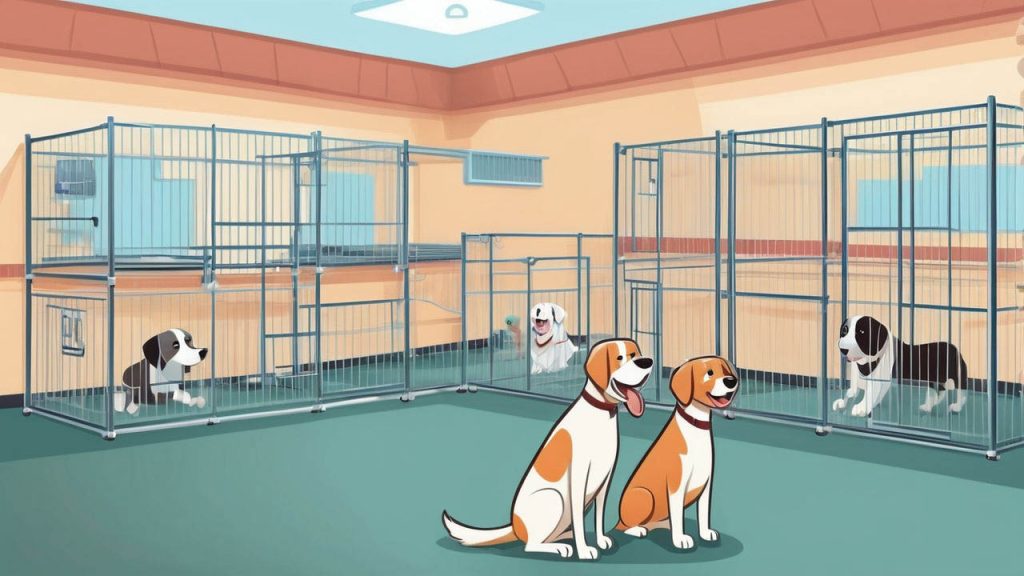Dog Boarding Kennel: Quality Care for Your Pet’s Stay
When you’re away, ensuring your dog has a safe and comfortable place to stay can bring you peace of mind. A dog boarding kennel provides structured care, interaction, and a secure environment for your dog while you’re gone. However, with so many options, finding the right kennel can feel overwhelming.
In this guide, we’ll explore the types of dog boarding kennels, what to look for in a quality facility, and how to prepare your dog for their stay. By the end, you’ll know what makes a kennel trustworthy and how to ensure your pet enjoys their temporary home away from home.
What is a Dog Boarding Kennel?
A dog boarding kennel is a professional facility that provides temporary care for dogs. Unlike pet-sitting or in-home boarding, kennels are designed to accommodate multiple pets, offering services like daily exercise, feeding, and sometimes grooming or playtime. These facilities are ideal for longer trips, as well as emergencies when you can’t be home to care for your pet.
1. Structured Care and Supervision
One of the key benefits of boarding kennels is the structured care they offer. Kennel staff follow a set schedule for feeding, exercise, and playtime, ensuring your dog stays healthy and active. Dogs are also constantly supervised, so you don’t have to worry about them being alone.
- Tip: Look for kennels that have a strong supervision policy and adequate staff to ensure safety in play areas.
2. Socialization and Exercise
Boarding kennels provide daily socialization and exercise, which can be especially beneficial for high-energy dogs. Many kennels have group play sessions or allow supervised interaction with other dogs, helping them stay active and engaged while you’re away.
3. Secure and Safe Environment
A quality dog boarding kennel is built with safety in mind. From secure fencing to climate-controlled spaces, these facilities offer a stable environment that keeps your dog safe and comfortable regardless of the weather or season.

Types of Dog Boarding Kennels
Not all boarding kennels are the same, and each type offers different levels of care and amenities. Understanding the options can help you choose the best fit for your dog’s needs.
1. Traditional Kennels
Traditional dog boarding kennels provide individual spaces or runs for each dog. They focus on basic needs, such as feeding, exercise, and restroom breaks. While they may not offer luxury amenities, traditional kennels are usually affordable and provide all the essentials for a safe and comfortable stay.
2. Luxury Kennels
For those looking to give their pet a more personalized experience, luxury boarding kennels provide a range of premium amenities, including private suites, cushioned bedding, additional playtime, and even “spa” treatments like grooming or massage. Luxury kennels can be more expensive but offer an experience closer to home.
- Tip: If your dog prefers a quieter or more pampered setting, a luxury kennel may be worth considering.
3. Veterinary Boarding
Veterinary boarding is designed for dogs with medical needs or those who require close monitoring. These kennels are often part of an animal hospital or clinic, with trained staff who can administer medication, manage health issues, and handle emergencies. Veterinary boarding is a great option for senior dogs or those with health concerns.
4. Pet Resorts
Pet resorts combine luxury amenities with extensive outdoor and indoor play spaces, providing dogs with more freedom and interaction. These facilities typically offer personalized care, spacious accommodations, and engaging activities, such as agility courses or swimming pools, making them an ideal choice for active dogs.
How Much Does a Dog Boarding Kennel Cost?
The cost of dog boarding kennels varies widely based on location, facility type, and additional services. On average, standard kennels charge between $25 and $50 per night, while luxury kennels and pet resorts can cost $75 to $150 per night.
1. Factors That Influence Cost
- Location: Boarding kennels in urban areas or high-demand regions tend to be more expensive than those in rural areas.
- Type of Facility: Luxury or veterinary boarding will cost more due to the level of care and amenities provided.
- Length of Stay: Many kennels offer discounted rates for extended stays, making it more affordable if you need boarding for several days or weeks.
2. Additional Services
Some boarding kennels offer additional services, such as grooming, training, or extra playtime, for an added fee. These services are optional, so be sure to ask about any costs upfront if you want to keep your expenses within budget.
What to Look for in a Quality Dog Boarding Kennel
Choosing the right dog boarding kennel involves more than just comparing costs. Here are some essential factors to consider to ensure a safe and enjoyable stay for your pet:
1. Cleanliness and Hygiene Standards
A clean and well-maintained facility is vital for your dog’s health. Check for clean kennels, regular sanitization protocols, and designated areas for different activities. A quality kennel should follow strict hygiene standards to prevent illness and keep your dog healthy.
- Tip: Visit the kennel before booking to ensure it meets your standards for cleanliness and organization.
2. Safety Protocols
Safety is paramount in a boarding kennel. Look for secure fencing, proper ventilation, and separate play areas for small and large dogs. Additionally, ask about staff-to-dog ratios; a lower ratio allows for better supervision and care.
3. Staff Qualifications and Attentiveness
Experienced staff make a significant difference in your dog’s boarding experience. Ask if the staff is trained in pet first aid and how they handle emergencies. A caring and knowledgeable team can provide both you and your dog with a positive experience.
4. Daily Routine and Activities
A quality kennel will offer a mix of playtime, exercise, and rest to keep your dog balanced and content. Inquire about the daily routine and any additional activities they offer, such as group play or one-on-one time. This will give you an idea of how your dog will spend their days.
Preparing Your Dog for Boarding
To ensure your dog has a positive experience, take some time to prepare them for their stay at the kennel. Here’s how you can help them adjust:
1. Pack Familiar Items
Bringing along your dog’s favorite toy, blanket, or bed can provide comfort in an unfamiliar environment. Familiar items help reduce anxiety and give your dog a sense of security.
2. Provide Clear Care Instructions
Write down your dog’s feeding schedule, any medications they need, and behavioral notes for the staff. If your dog has special needs, make sure to communicate these clearly to the kennel staff.
3. Schedule a Trial Stay
If possible, arrange a short trial stay at the kennel before a longer visit. This allows your dog to become familiar with the environment and the staff, making their longer stay more comfortable.
FAQs About Dog Boarding Kennels
How much does dog boarding typically cost per night?
- Standard dog boarding costs range from $25 to $50 per night, while luxury options may cost between $75 and $150 per night.
What should I bring to the boarding kennel?
- Bring your dog’s regular food, medications, and any comforting items like their bed or favorite toy. This helps keep them comfortable and reduces stress.
Can I visit the kennel before booking?
- Yes, most reputable kennels encourage visits. This allows you to inspect the facility and ensure it meets your standards for safety, cleanliness, and care.
How do kennels handle emergencies?
- Many kennels have protocols for emergencies, including access to a vet. Ask about their emergency procedures to ensure your dog will be well cared for if an issue arises.
What vaccinations does my dog need for boarding?
- Most kennels require proof of vaccinations for rabies, distemper, and Bordetella (kennel cough) to protect all pets in their care.


